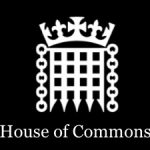The Capillary Wave

The Common Common Law Trap For Commoners
A Capillary Wave Article via: C M EDWARDS October 2023
An Examination of the English Common Law as Practiced by Legal Professionals and as Taught Online by Laypersons
Table of Contents
- Introduction
- The Common Law perspective Of The Online Communities Who Teach It
- Are You Against Having Your Current Common Law Perspective Changed?
- Let Us Examine Some Key Words
- The Structure Of Law & Governance In Many Countries
- The Common Law Perspective Of The Professionals
- What Is A Commoner?
- Why Is Common Law Called Common Law?
- What Is Common Law?
- Why Do So Many Online Common Law Practitioners Lose At Court?
- Common Law: A Summary Based Upon The Evidence
Introduction
The aim via The Capillary Wave is to explain law and governance for the common person. The common person is all too often taken advantage of either by other ignorant individuals and teachers, or by deceptive ones. Persons can be taken advantage of by a fellow citizen and even a government body; but only usually if the individual lacks knowledge.
This article aims to look at both sides of the discussion around the topic of common law. I say “both sides” of the discussion around the topic of common law because there are two camps involving the one topic of: common law. The first camp is the legal profession, and the second camp are ordinary laypersons with no legal training or qualifications that are interpreting common law to mean something completely different from what the legal professionals and court system know it to be.
In the UK, CANADA and other countries, in recent history there is what appears to be another form of common law being discussed and acted upon by large numbers of the population. This article will put on trial this other version of what is commonly called “common law” by an entire subculture of persons who claim to use this other version of the law, and also teach and promulgate their theories about it online and in seminars around the country. So what is the common law and which side is correct, the barrister’s or the layperson’s?
Together we will examine what the layperson exponents think and say about the “common law,” we will examine what the legal profession says about common law, and what their opinions are of the other version of the “common law,” which is widespread on social media groups. I will also add my comment and findings to the debate, and we will outline in very simple terms what common law actually is, and how it functions in the UK and globally, we will also reveal to you why indeed it is called common law.
This in-depth study of the topic aims to equip the reader with various resources and information so that you can better understand the subject, and not be taken advantage of. This article aims to help the common person avoid some of the pitfalls surrounding the subject of what is commonly called “the common law” by many online gurus, and in many social media discussion groups. I will not be using lots of legal sounding terminology, this will all be explained in plain and simple English, and using common sense and logic. I will lay out some of the main talking points, I will show you some of the players, and I will add comment and perspective from active legal professionals and others, I will also add my own comment as we go. It is hoped that by the end of this article you, the reader, will be well versed in all things common law, that you will be able to avoid being duped, and to see a path through the jungle of the online study of: law and governance.
The online “common law” argument and discussion sometimes gets lumped together with what is often referred to as “the freemen of the land”, and can include in the same remit talk around the “Magna Carta”. Another phrase to listen out for, which will let you know that you are in the realm of online “common law” chat groups is, “Lawful Rebellion“. Those that are in these “common law” and “freeman” type groups, often follow similar belief structures about their version of the law, which I will get in to here. This will be a one-stop shop for everything to do with the discussions around, and some of the players involved in, the “common law,” as perceived and taught online by laypersons and gurus. We will also discuss the common law from the legal professional’s point of view, which is the law that is in actual force and effect, for the citizens of the: UNITED KINGDOM. Do not confuse the two, they share the same two words common and law but they are very different beasts in the minds of each camp. On that precise point of confusion, to make it crystal clear; when we are discussing the real and tangible English common law system, it will be written thus; common law. When we are discussing the common law which is the online, social media communities version of the same law, it will be written as either: “common law” and or: PCL (Pseudo Common Law) as I have termed it.
The average person who has encountered a legal problem, who then decides to research law online, or is exploring for themselves what their rights are, or how law and governance works, will most likely come across the terms; common law, and know your common law rights, freemen on the land, or even Magna Carta, especially on social media, where many of these groups discuss these topics, purporting to make you “free of government control,” or similar.
There is an entire subculture of laypersons within some social media, consisting of tens of thousands of persons, who claim to understand what common law is, and how to use it to your benefit, for any legal matter, be that: not paying council tax, to withdrawing your consent to be governed, to living on the land without permission. This PCL is usually being espoused by some layperson leader, teacher, or guru with a large following, and this twisted version of the English common law, has got nothing to do with what academia, lawyers and solicitors, understand the common law of England to be. This is precisely why, sadly, so many of these gurus and their followers fail so miserably at court, losing their house, property, and sometimes their freedom, as we shall evidence.
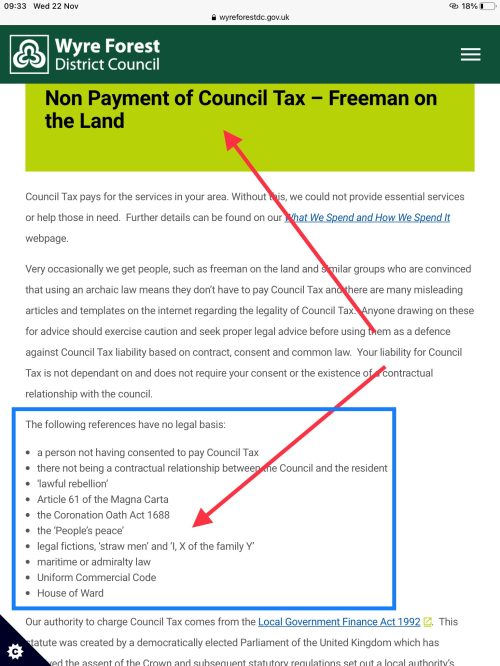
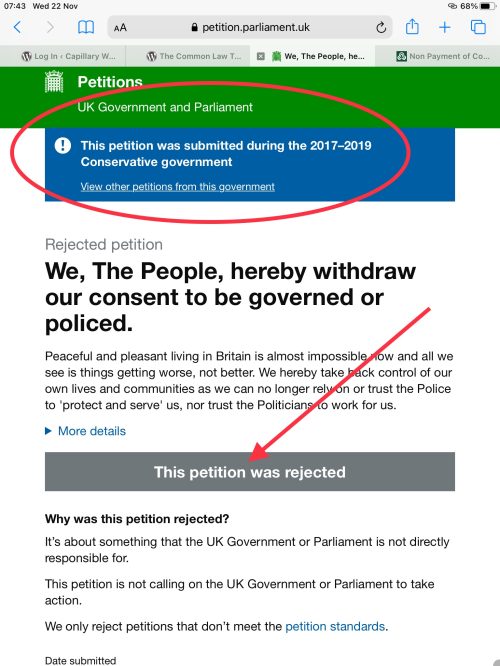
The Common Law perspective Of The Online Communities who Teach It
I have spent a lot of time in some of these PCL environments and online groups. Speaking from experience, if you ask any “common law” guru, “common law” group admin, or follower of PCL, to point you to something that you can research, to show you some valid documentation, or information where you can examine this “common law” properly, and its principles, they can ignore you, block you from their group, call you a shill, or point you to some letters they have created, affidavits they have made, or statements that the group admin or “common law” website creator has put together. Some teachers may even point you to a “common law” website that a person called Mr John Smith has created called: “The Common Law Court”, anyone who attempts to find any official documentation, court transcripts, case law, official recognition of what they are calling “common law” to research, will abruptly find out that there is nothing, apart from some documents that some layperson has created themselves. There is no source of information, no reliable case law, nothing in the Criminal or Civil Procedure rules, nothing that the Crown recognises about their version of “common law” that can be scrutinised in any way.
Ultimately when searching for evidence of this “common law,” what you are left with are the thoughts and opinions on law, from some social media group admin or website creator, who share their own opinions, and the paperwork they created, with their own group members, such as affidavits and other sworn statements of truth. This can create a cult like atmosphere, and a big echo chamber, whereby anyone who questions the group narrative will be quickly blocked by the admin, or even rounded on by the followers.
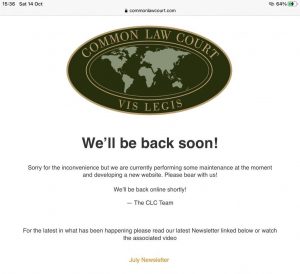
One such example of a “common law” advocate has created his own “Magna Carta 2020”, another – Mr John Smith – has created a “common law” court. Here Mr Smith talks about “common law”:
• “Common Law” Discussion by Mr John Smith
As of the date of writing this article [the date is on screenshot] the “Common Law Court” is offline, and has been for some time. This posses some interesting questions in and of itself, such as:
• Does this mean the “common law” has now disappeared?
• What will happen to the “common law” if Mr Smith has passed?
• What did people do for “common law justice” before Mr Smith created his website?
• If you were to create a “common law” website, does that mean there are two different “common laws” in existence?
• What if the person you wish to take to “Common Law Court” creates their own “Common Law Court”, and you are taken to their “Common Law Court”, before you get the opportunity to take them to your “Common Law Court”?
• What “common law” court is Mr Smith answerable to, and who holds him accountable?
• Do those questions reveal any possible flaws for the laypersons personal “common law” position, in your own mind?
A lot of “common law” followers, and the advocates themselves, often find themselves losing court cases. Is it possible that their own arguments could be the issue, or is it likely that all of the institutions are corrupt, and every single person in them? We will get to the bottom of these questions.
Mr Smith is just one example of a PCL teacher / guru; and there are many. You can easily find lots of “common law” gurus and advocates on the internet with a quick search.
Let us now take a look at another popular “common law” actor who calls himself: “Michael O’ Bernicia”.
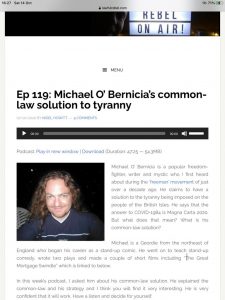 Because there are so many interviews available online, we can give the “common law” exponents position a full airing, and they can explain their position, in their own words, so as there is no possible chance of misrepresenting what it is they are claiming.
Because there are so many interviews available online, we can give the “common law” exponents position a full airing, and they can explain their position, in their own words, so as there is no possible chance of misrepresenting what it is they are claiming.
We can then examine what is claimed openly, and compare it to what legal professionals make of their arguments. We will then go on to explain clearly where common law derives, why it is called common law, and how it operates in the UK; something many of these gurus fail to elaborate on themselves.
As stated in the text on the image, “Michael O Bernicia” claims to have a “common law” solution to the “covid tyranny,” which appears to be something resembling a law that he is declaring, and it is called “Magna Carta 2020”
Here is a link to the full interview:
Here is a link to Mr O‘ Bernicia’s website where readers can learn more:
• Mr Michael O’ Bernicia’s Website
What will happen if we apply the same logic as we applied to Mr Smith’s “Common Law Court,” to gently test the position of Mr O‘ Bernicia?
• If Mr O‘ Bernicia and his friends can create a “Magna Carta 2020,” does that mean you and your town, village, or neighbourhood can too?
• Would your version of “Magna Carta 2020” have more power than Mr O‘ Bernicia’s version?
• Can everyone at Britain create their own laws that they will live by, as Mr O‘ Bernicia appears to have done?
• If everyone could make their own law, do you think that would lead to more peace, or more chaos?
• Who carries out the punishment for those that contravene “Magna Carta 2020,” are they taken to the “Common Law Court”?
• Is this Guardian article referring to Mr John Smith’s “Common Law Court”, and some of these social media groups below?
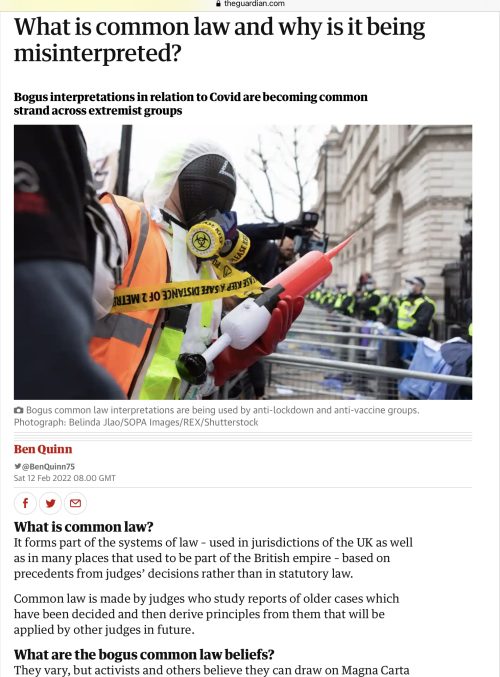
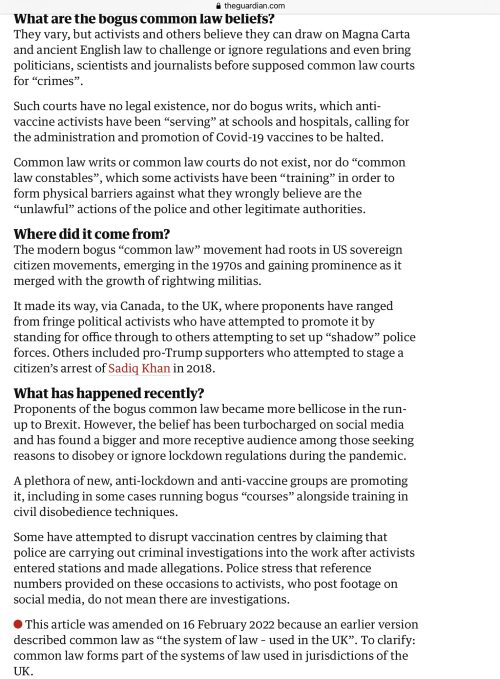
Here are some various “common law” type groups that can be found on Facebook, each group has a substantial following:
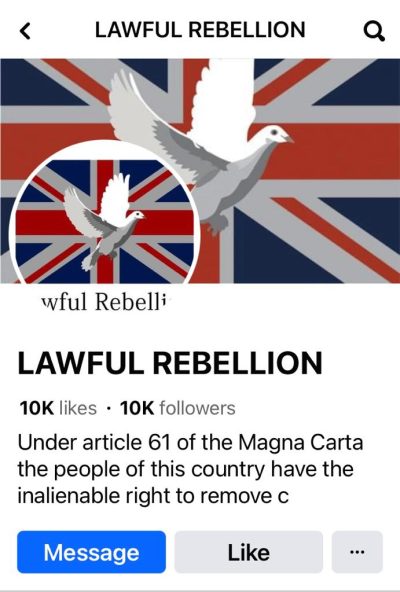
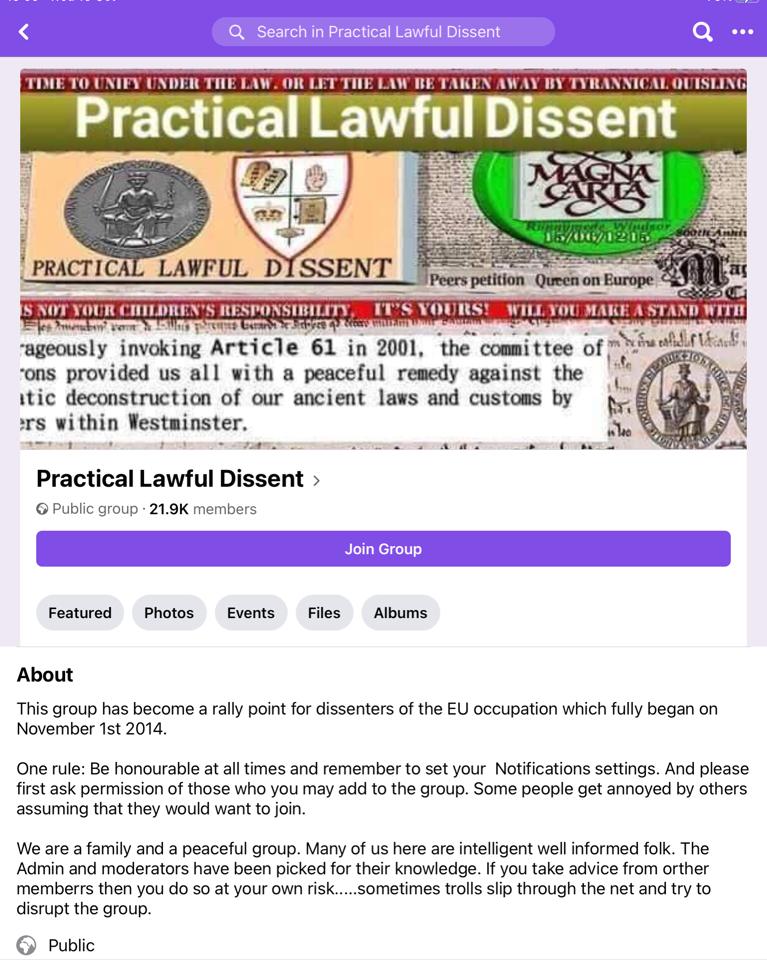
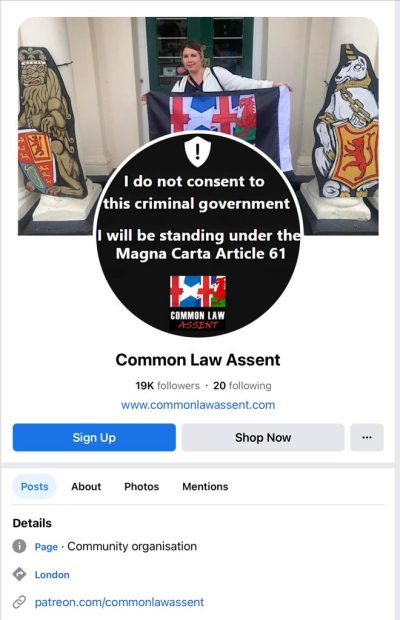
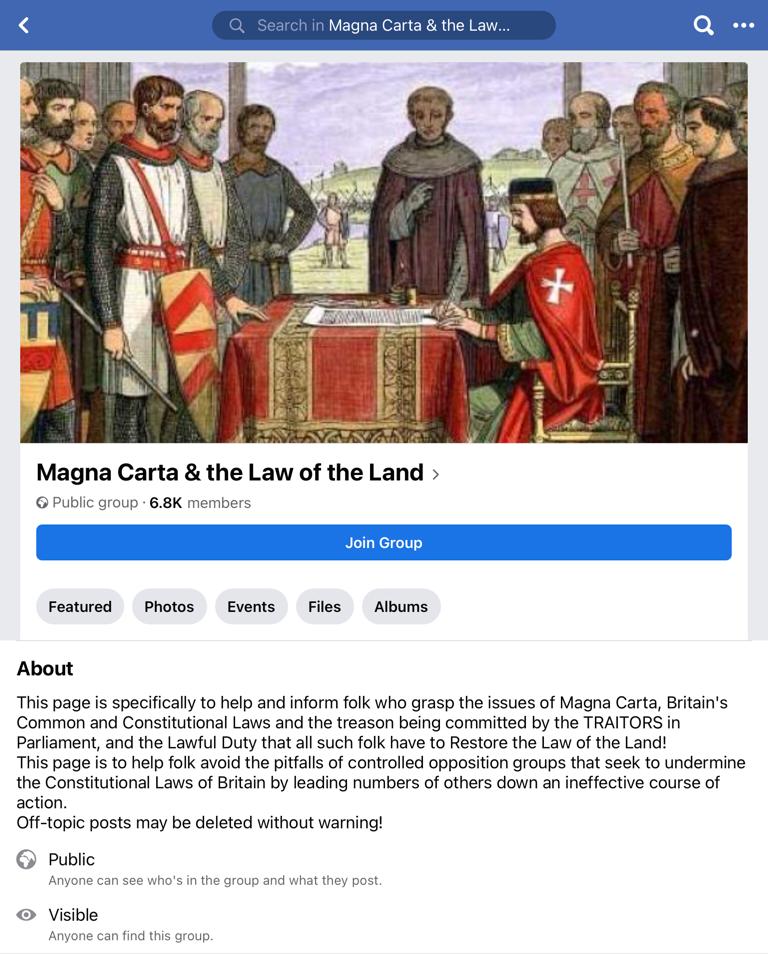

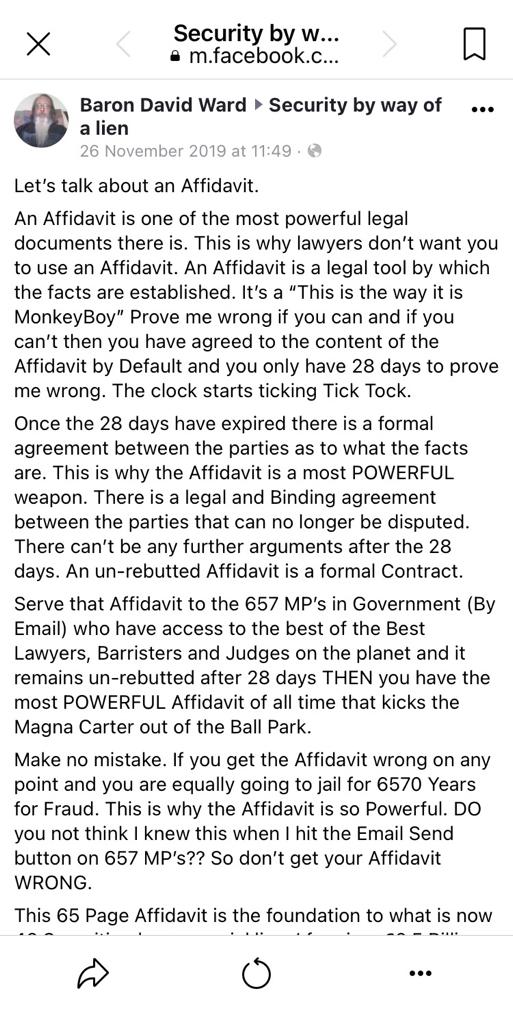
Is “common law the solution to tyranny”?
A proper solution to “fight” legal issues from government either exists in reality, or it does not exist at all. I can, and will show you at this website via our many articles, that a proper, tangible, verifiable, and real solution to legal problems, not only exists, but it has been in front of you, your entire life.
A proper solution to any legal issue One might face has to be a solution that is available and open to everyone, or it is not a solution at all. The point being is that there is nothing tangible to scrutinise this PCL with or by, it is all based on random persons, with their own random opinions and statements, on their own websites, with documents created by laypersons who have no real clue about how the law works, and how they are governed, as we shall prove. The documents that are compiled by a group admin, “common law” website creator, or guru contain little basis in law or governance, have few reliable facts, and provide little evidence that would stand up in a Crown Court, or that could even verify or substantiate their own position. I would not wish to be going to court with documents prepared by some group admin, or with paperwork from the “Common Law Court,” when my own house could be in danger of being repossessed.
Surely it is much easier to use real tangible evidence and facts, from sources that the Crown will accept as evidence? This way your chances of success are greatly improved. In other words, why not use an argument based in reality, using facts and evidence, which the Crown also agree are facts and evidence? This is not only possible to do, but it is my very aim and purpose for this website, to show the public and Capillary Wave members, how to use an argument which is based on real facts and evidence. Without the need for a guru or opinion.
If theoretically you are going to stand a chance of any success at court with your PCL type arguments, it would be a good idea for your defence and evidence to make sense to the Crown (your opponent), and not just yourself. Surely the evidence must be valid, legally speaking? That is not to say that you are making a legal argument, but rather that your argument must make sense in the legal world, and it must obviously make sense lawfully also, and lastly, it must be provable and verifiable. Everything that you state and claim, must be provable if challenged. It can not just be your opinion or belief, or you will lose, and be convicted on your flawed conviction.
On this platform I will lay out and prove, with facts and evidence, in great detail showing you precisely the rules the Crown and governments follow and obey, what the Crown regards as the Law, and the source of all Law. Did you know that government follows a strict set of rules?
The arguments and information laid out at here in my articles, have to be accepted by the Crown as a valid defence evidence, because it is already pre admitted and regarded as such by the Crown itself, before you even turn up to court. Surely that would be building a reliable case for the defence “Rule101”.
If you are involved in PCL or thinking about using some of its arguments, you should at least consider the possibility that if a method / belief of taking on authority using PCL type arguments are shown to be at best questionable, and at worst wrong (which I will do in this article) you should pay very close attention; because your house, or well-being may well depend on you getting your argument right at court, using real and accepted evidence. If your argument stands a chance of winning, it needs to be a valid one which is accepted as such by the Crown. A Crown barrister says the PCL argument will not be accepted as valid, and is an erroneous argument. I for One would listen to that, not least because he has nothing to gain from telling you.
Now that the intention for this article is clear let us get on with exposing the common “common law” trap that many commoners commonly fall in to:
Here are some public “common law” speakers and their cases which they have made public:
Here are a list of some of the many “common law” practitioners whose personal ideas on law and governance are publicly available online, and have been very publicly tested:
1. Mr Baron David Ward here explains that “government doesn’t exist”. He bases this belief on the arguments he used when winning a case against a £70 parking infringement. When dealing with a legal issue it is worth considering the seriousness of the offence. Almost any legal sounding argument against a minor parking ticket violation may well gain you a “success,” in that they decide it is just not worth pursuing a “difficult customer,” especially when so many parking offenders just cough up with no defence put forward. It may be quite something else to apply the same arguments or strategy used for a minor parking violation say, than when defending Ones house against the Crown:
• Baron David Ward Interview – Awakening Nation
Here the government exercises its executive duties, and sadly shows up to take control of Mr Ward’s house and property:
• Baron David Ward – Beat The Banks And Bailiffs
2. Mr Tom Crawford also went on to be advised by Mr Michael O’ Bernicia, and Mr Guy Taylor on his case, to try and save his house from the bank repossessing it. Mr Crawford very publicly, and sadly lost his house over a dispute with the bank. I was at Nottingham with thousands of others in an attempt to halt the police and bailiffs evicting him:
3. Mr Michael O Bernicia wants to enact a new “Magna Carta 2020,” as we have already seen:
Mr O’ Bernicia is seemingly in the process of laying criminal claims against several [former] government ministers /MP’s. He has hired a barrister for this case as seen in the link below:
Mr O’ Bernicia has placed himself in a real paradox, because he has on occasion hired a Crown barrister. He is the only guru mentioned here that has done such a thing, which I find very interesting indeed.
Only a person and commonly a citizen of the UNITED KINGDOM can engage a barrister. Anyone that has hired a solicitor before will know all of the identification checks you have to go through first, thus ensuring the status of personage. It seems strange to hire and rely upon a Crown barrister, the legal profession and system on the one hand, yet at the same time, with the other hand attempt to step outside of, and rubbish the framework of the entire legal system by creating your own laws. One can not have One’s cake and eat it. For those that would like a further legal explanation on this point:
Mr O’ Bernicia’s case is a non starter and highlights an ignorance of this important aspect of law and governance; because in simple terms, he has undermined his own position from the outset. He claims the case is being brought by the People of Britain, when in fact it is being brought by persons of the UNITED KINGDOM, undoubtedly. A person is by definition under the jurisdiction of the Crown and UNITED KINGDOM’s governance, and by hiring a barrister, this ensures the status of person. A good comparable example might be: A Private soldier (lowest rank) in the military, attempting to use the military jurisdiction to court-martial a General (top rank). Whilst simultaneously trying to undermine the military jurisdiction, by creating his own military jurisdiction, and to attempt to influence some of the Generals men to join him in his own Army. I think it is a non starter for obvious reasons evidenced here.
4. This is Mr Guy Taylor speaking at a meeting of the British Constitution Group. I have also attended such meetings in the past:
• British Constitution Group – Mr Guy Taylor
Here is Mr Taylor attempting to persuade police at a property of his:
• Bodenham Manor – Mr Guy Taylor
I have also briefly met Mr Taylor at Mr Crawford’s court case / demonstration at Nottingham’s Family Courts. Mr Crawford’s case was widely publicised at the time on the news. Mr Taylor also lost a house and property I believe. I met Mr Crawford near London when I was involved with a few others who were invited to attend an address (Mr Ebert’s) to halt an eviction from his house by police and bailiffs. I have been immersed in this culture of “common law” myself. I have met some of the players, I have attended meetings, and I have been physically involved in helping persons try to keep a roof over their head with others. One large difference however is that I kept going with my own personal research in to law and governance, whereas many others seem to get stuck at “common law.” I came to see the holes in the “common law” position, and I came through it to a new understanding, and a different way to successfully make an argument against any would-be legal intrusion.
So, we have now seen the some of the evidence for what some of the speakers, teachers, and gurus have to say about the state of the government as they see it, and also their perception of the legal system. We have heard how some of them have employed various ways to win at court against the legal system, and we have seen that they all advocate in some way or another for the “common law.” Sadly we have also witnessed their arguments and their beliefs failing when it really mattered the most – not just against a parking ticket – but in very serious matters, which have had very real and devastating results for all concerned.
My Own Journey Through “The Common Law”
I myself came through “the common law phase” with my own research in to law and governance, when I suddenly found myself in a couple of unrelated, but very serious legal arguments with authority; one with a local authority and the other with HM Revenue & Customs. I did what a lot of laypersons do when they can not afford a solicitor, and are in a serious legal corner with seemingly no escape; I started researching law and governance for myself. When One starts to research law, governance, and contracts yourself online, it will not be long before you come across laypersons talking about “the common law,” “Magna Carta”, and your “common law rights,” you will most likely also hear about the “freemen on the land” movement.
Let me make this clear from the outset, my intention here is not to deride those individuals who are “using”, or who are involved in PCL; especially as I myself was once one of its proponents and advocates. I respect that these teachers and gurus are trying to solve legal issues themselves. My intention with this article is to help others out there, who like me were in a tight legal position, and to help others who are exploring law and governance. My intention is to provide a full examination of this subject so that you can reach your own conclusions based on easily researchable facts and information. I even wrote a book based on the “common law” principles for my newborn daughter, and some of my then “clients,” explaining the fundamentals of the system of “common law” as I saw it. You could even say that I was once a “common law guru,” who better perhaps to explain the myths and thinking surrounding the topic, and point out my own shortcomings, and those of the common law itself?
My book will be made available to members of The Capillary Wave. It will not be made public as it needs to be read with a “warning”, I can not have my own publication furthering the PCL mythology. It is precisely because I lived through this experience successfully, and was fully immersed in it, that I fully understand all aspects of the subject matter, and the mindset of those involved in it.
I did not know it at the time, but looking back now, “my version” of the “common law” had us doing all of the right things at court, but for all the wrong reasons; and there’s the rub, PCL is so alluring, so tempting to believe because, believe it or not, some of it has the truth running through it, many of us know that so much of it just sounds right, and you might be surprised to hear me admit that it is; which is why it is such a very dangerous trap. It is the cause / argument / idea that got me very interested in law and governance. It is because PCL sounds so right, is so close to being right, that so many get trapped there, and stay at this level of argument, not realising that it is merely a stepping stone to the ultimate truth about law and governance, which anyone can find, and is readily available to scrutinise – we will be exploring this aspect much more fully through our various articles.
Let us just be brutally honest here, for most people who are not very well educated, uneducated, uneducated in law, and are not academic (like me) PCL was our first introduction to the concepts of the law, and how it actually works and might effect us. It made / makes sense to us. The concept of “common law” is rooted in truth, and the concept is admirable, the concept is: do no harm and cause no loss. The concept is simple to understand, and it sounds correct, because it has some validity; it has validity because real laws are based around these moral values. Most importantly however PCL gave / gives us hope that we can be free of our legal problems, be that from government and Parliamentary interference in our lives, or a debt collector. PCL is very alluring to most of those persons searching for help, advice, and answers (on the internet and social media groups), because in a lot of cases, they are desperate for help, can not afford a solicitor, and are vulnerable to being persuaded about a simple sounding solution; a solution which sounds very much like it could and should be right. Something resonates with us somewhere deep within about these concepts, and that can be dangerous if you are not prepared to objectively scrutinise something before diving in head first.
Are You Against Having Your Current Common Law Perspective Changed?
I have no doubt that this article will attract the attention of many who are either thinking about getting in involved in “common law,” or who are already heavily involved in the “common law”. It is for this reason that I have compiled some basic questions below to see if those very persons are ready to accept this “new” information to be revealed about the common law, and the evidence that backs it up. You could call these questions a: cognitive dissonance test.
I have said that I have been immersed in this subject, possibly for a decade. The information that will be presented herein is readily available to the layperson, yet I have never before seen it spoken about, or presented in any “common law” seminar or discussion that I have ever attended. I have never heard any “common law” advocates teach it, or even mention it. So I am sure that when the simple truth about the “common law” is revealed, it will also become very obvious to thousands more, and it will hopefully put a stop to persons losing their house at court, and persons being mislead either intentionally, or by ignorant “teachers”.
This article will prove beyond any doubt that the popular view of PCL that is being taught at seminars, and on the internet is incorrect in fact, and in law. This article will prove beyond all doubt that “common law,” as taught online, is actually nonsensical. These common law gurus will hopefully be humble enough to see the light and move on to the actual solutions, which will be revealed fully herein. There will be opportunity to further this discussion, and get more information at our public Facebook group – The Capillary Wave:
If you are blessed with common sense and the skills of critical thought, logic and reasoning, I ask you to consider these below listed principles of law and governance before we proceed to debunk the PCL argument, and shake it from the sandy foundation it sits upon.
Can You Handle The Truth?
Would it be silly to state…
1. That the system of law and governance relies upon your consent, the consent of the governed?:
• Theresa May – Policed By Consent
• Metropolitan Police – Cressida Dick – Policed By Consent
• See my article “How You Became The Government” for further evidence and analysis
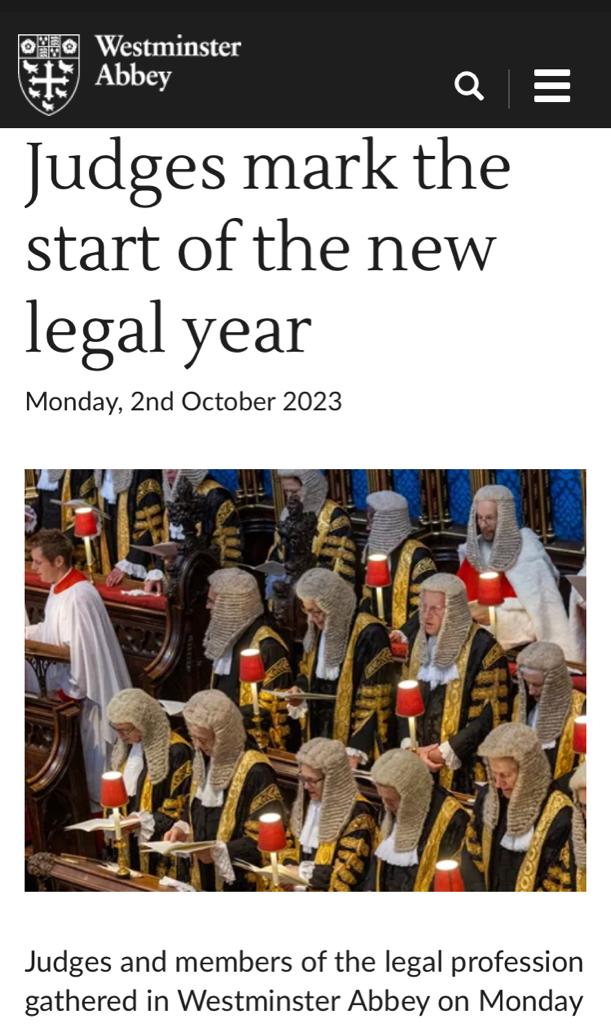
2. That the system of governance itself follows a set of rules and laws, and it is not therefore a “corrupt and tyrannical” free for all:
• See my article “The Framework for Law and Governance” for further evidence and analysis.
3. That the ultimate authority in the UNITED KINGDOM which is a Christian country is verifiably and irrefutably: The Holy Scriptures (The Holy Bible):
4. That just because you do not understand a thing, that it does not then follow that the thing is corrupt by default. It might just mean that you do not understand it.
5. That because someone challenges the thing you believe in, it does not automatically make them a troll or a shill, neither does it necessarily follow that they dislike those that they are in disagreement with.
6. That if your method / belief and your means of understanding law and governance does not work, or it is not accepted by the Crown, and therefore keeps failing and getting you in trouble; then you must accept the possibility that you could be wrong, and that it might not be the system that is wrong. I would suggest that if you lose a house, or a car for example by following your own beliefs, or worse, the beliefs of others about the PCL concept and methods, the chances are that it is your understanding of the situation that is seriously wrong, and that [at the very least] has to be a possibility.
7. That words have meanings and definitions, and that these meanings and definitions are of vital importance for our understanding of the world around us, and that is crucially important when discussing such precise and detailed areas such as the law – which is made up of a body of words.
Believe it or not, in my experience in dealing with PCL advocates, this most basic of points has to be stated when debating them because, many PCL types will not, and do not accept word definitions, especially when it does not suit their agenda. This can be the level of self deception that we are dealing with, in some cases of the common common law trap for commoners.
If the reader does not understand some of the basic points numbered above, I respectfully state that you really should not be attempting to take on authority, and I would suggest that this website is the perfect place for you to begin to understand how law and governance actually works. There are real distinctions between a belief and evidence based facts.
If the reader can at least agree on the above few principles of law and governance, and common sense, then the chances that you will learn something new from this article are extremely high. If however the reader is subject already to a cognitive dissonance, then it must stated that you may already have fallen in to the common common law trap for commoners, and that now that has happened, One’s own ego is going to keep you there; ensnared.
If One can not accept the above basic principles, then One has to agree that One is following a belief system, and is not open to an argument based on logic and reason, because the evidence supporting the above numbered points is overwhelming. If this is the case, and you are entrapped by this PCL belief, then it is highly likely that you will lose everything at a court of law one day. If this is something that concerns you, I would suggest kindly that you read on.
“When an honest man, honestly mistaken, comes face-to-face with undeniable and irrefutable truth, he is faced with one of two choices, he must either cease being mistaken, or cease being honest.” -Anonymous.
Nearly Right Is Still Wrong
If those who follow PCL concepts and gurus are not careful they can get trapped at this level of understanding and comfort, and they can also let arrogance take a foothold if they are not vigilant about it, and so many advocates do. As we have seen, the internet is littered with videos of PCL advocates and gurus who have very sadly lost their own houses, cars, property and even their freedom. Yet because the common law trap is so alluring they continue to defend their position, and call the authorities “corrupt”, but importantly; they often fail to look at their own arguments and actions, they do not understand how the law works, or the very basics about how they are governed. It is my hope that after reading the articles at this website many persons will change their views on PCL and understand fully how the system of governance really works. I am here to raise the bar for the information and evidence that is readily available for the common person, to enable them to read and learn about how the system of governance actually works [without the need for a guru to interpret it for you]. It is not until we are prepared to objectively examine and scrutinise the PCL, and delve much deeper in to this subject that we might begin to realise that “common law” – as it is taught on the internet by laypersons – is not entirely correct.
A lot of the PCL type argument as previously stated is based on or around the truth, it has to be admitted in an honest conversation that it does touch on the truth, and has good moral principles. The most successful lie often has an element of truth in it. PCL is very easy to confuse with the truth, but as for PCL being the actual truth, no; no, it is ultimately not true. Charles Spurgeon once said “discernment is not knowing the difference between right and wrong. It is knowing the difference between right and almost right”. This has never been more appropriate than when dealing with PCL advocates and concepts.
Let us talk about status and capacity. Right off the bat whether you are likely to have any success at court using a PCL argument (and you definitely will not) depends entirely on the status and capacity of those attempting to “use it” [warning, this is where things can become confusing]. Firstly, stating as I have above that this PCL can be “used” at court is a misnomer, because there is no such thing as “common law” (PCL) as most of the “common law” (PCL) gurus and internet groups on “common law” (PCL) explain it to be. This is why they continuously lose on big cases. They may get success on the small issues like parking tickets, but importantly ultimately never the big cases.
We have already heard about the PCL from some of those claiming to know about it and use it. Now let us hear from a legitimate Crown barrister on what he thinks about the subject:
- Freemen On The Land , Magna Carta – Black Belt Barrister
- Common Consent, Consent To Be Governed – Black Belt Barrister
- Why These Arguments Don’t Work – Black Belt Barrister
It is very clear what a barrister thinks about this PCL argument, there is no mistake. These comments come from a barrister – someone who if found guilty of publicly misleading people would be disbarred – publicly informing us that “common law,” “Magna Carta,” “freemen on the land” and the like, are nonsensical arguments as found widely on the internet.
It is symptomatic of a belief system and evidenced by those who practice PCL, that its very own proponents will not listen to, or accept what a trained barrister has to say on the matter of their “common law” position; precisely because it does not fit their belief system of what they imagined the law to be. It has not entered their minds that a practicing barrister would be expelled from the BAR for publicly giving out false information. A barrister on a public platform has to be extremely careful about the information he gives, if he would like to keep his job and not get sued. There are also organisations that oversee the legal profession to ensure that standards are maintained. Everything this barrister states publicly must be accurate, and according to the law for obvious reasons.
Perhaps we should be listening very carefully as the barrister is someone that you, quite feasibly, could meet at a courtroom as your opponent for the Crown. The “Black Belt Barrister” has made these videos on YouTube debunking the “common law”. If you ignore a barrister telling you plain and simply, that your arguments do not work, how on earth do you expect to win your case at court, in the real world, with real consequences for losing? Surely that is how One builds a defence case? Surely that is “defence case rule building 101”? “Defence case building rule 101”: make sure your defence case and therefore your argument stacks up, and that the Crown already accepts your premise, and therefore will accept your evidence. Clue; if you have a legitimate barrister telling you that your PCL argument is wrong before you ever get to a court, the chances are a judge will think so too, and the chances are you will lose as so many PCL advocates do.
As clarified above by the “Black Belt Barrister,” most PCL teachers / gurus believe the “common law” to be separate and distinct from the: UK / AUSTRALIAN / CANADIAN / IRELAND etc. Parliamentary Acts and therefore Parliament itself. They believe “common law” is something that stands on its own, and is not under the legal jurisdiction of a government. They believe it is “natural”, or “natural law,” as it is sometimes referred. They believe this version of “common law” is just “out there,” to be claimed by anyone who knows and understands it; some ancient right to be plucked from thin air. This is demonstrably wrong, as we will continue to investigate herein as I explain further.
“common law” (PCL) as typically featured in talks like this one here available online
and by many other advocates and persons, does not exist in reality, it only exists in the minds of the gurus and their followers. Nowhere can you go to examine a paper on it, scrutinise its corpus, precisely because it is not real, and here is the common law advocates conundrum:
- If nobody from officialdom accepts PCL, and it is the same officialdom that you are fighting; how on earth can you fight officialdom with something they do not accept as being real or true, and you can not point to anything to prove it is?
The point being is that these PCL arguments have very real and serious consequences, and those most vulnerable to the PCL belief system, are the proponents themselves; I warned you that it was a very alluring and dangerous trap. The trap door in most cases is wedged irreversibly shut, when a guru amasses a large following. How then at this stage of infamy could the guru possibly change course, and admit they are wrong, then lose that following? That would take real courage and integrity, and most gurus become somewhat arrogant in their pride and stance, on the subject of law and governance, making them unable to accept any reasoned position which is contrary, and categorically proves that their beliefs are wrong. This is when you will understand that you are dealing with a belief system, which the guru himself is aligned with, and fully invested in.
If the above were not true, they would find it very easy to change their mind, once provided with the evidence and facts on their mistaken beliefs. To prove this very point, I challenge you to take this article and share it within your “common law” circle of friends, or social media group. See for yourself if you have entered in to a cult, or see for yourself if you are dealing with a reasonable group of persons, who are genuinely searching for the truth. If your freedom, house, or livelihood depends on your arguments being correct, I would suggest this move would be a very good litmus test, and watch for the response, especially from your groups admin. See if the response is measured, calm, and reasoned, and note whether any rebuttals to the claims made herein can be intelligently made, sourcing any official documentation whatsoever, to refute what is claimed here. They can not, and therefore will not supply any information that is not from a “common law” social media group admin, or from some random layperson on the internet. Why would you risk so much based on so little?
I claim that the PCL is truly a belief system, because it does not exist at all whatsoever, in governance or law. There is nothing that these gurus, or anyone, can point to that would prove their “common law” exists, let alone from where it is derived. It can not be examined. Again, not to be confused with the English common law system, which is case law, created by judges and maintained and overseen by Parliament under the legal system. This is the common law which can be explained, pointed to, scrutinised and discussed with legal professionals, like solicitors and barristers.
Let Us Examine Some Key Words
Whatever subject I investigate, I always start at the start with word definitions. This usually gives me a feel for what is ahead, and clues as to what I am dealing with. So let us examine what the word “common” means, then you can make your own mind up as to whether it is a good, or bad thing:
• From Strongs Concordance: [COMMON]
< 2839. koinos >
Strong’s Concordance koinos: common
Original Word: KOIVOS
Part of Speech: Adjective
Transliteration: koinOS
Phonetic Spelling: (koy-nOS’)
Definition: Common usage: (a) common, shared, (b) Hebraistic use: profane; dirty, unclean, unwashed.
HELPS Word-studies
2839 koinos – properly, common, referring to what is defiled (stripped of specialness) because treated as ordinary (“common”). 2839 /koinos (“defiled”) describes the result of a person reducing what God calls special {holy, se( apart) – to what is mundane, i.e. stripping it of its sacredness.
2839 /koinos (“defiled because treated as common”) is always used negatively, i.e. for what is profaned – except in Jude 1:3 where it refers to the gift of salvation shared (held in common) by all true believers.
[2839 /koinos (“common”) typically refers to spiritual desecration. This happens when a person treats what is sacred (set apart to God) as ordinary (“not special”).]
• From Online Etymology:
common (adj.)
c. 1300, “belonging to all, owned or used jointly, general, of a public nature or character,” from Old French comun “common, general, free, open, public” (9c., Modern French common), from Latin communis “in common, public, shared by all or many; general, not specific; familiar, not pretentious.” This is from a reconstructed PIE compound “ko-moin-i- “held in common,” compound adjective formed from *to- “together” + “moi-n-, suffixed form of root *mei- (1) “to change, go, move,” hence literally “shared by all.“
common (n.)
c. 1300, “a fellowship or brotherhood; early 14c., “people of a community or town, freemen, citizenry;” late 15c., “land held in common,” from Old French commune and Medieval Latin communia, and partly from common (adj.). Also compare commons. Latin commun/s “common, general” (adj.) also served as a noun meaning “common property; state, commonwealth.”–common law (n.) mid-14c., “the customary and unwritten laws of England as embodied in commentaries and old cases” (see common (adj.)), as opposed to statute law. Phrase common-law marriage is attested from 1909.
• man (n.)
“a featherless plantigrade biped mammal of the genus Homo” [Century Dictionary], Old English man, mann “human being, person (male or female); brave man, hero;” also “servant, vassal, adult male considered as under the control of another person,” from Proto-Germanic *mann- (source also of Old Saxon, Swedish, Dutch, Old High German man, Old Frisian mon, German Mann, Old Norse maðr, Danish mand, Gothic manna “man”), from PIE root *man- (1) “man.” For the plural, see men
• person (n.)
c. 1200, persoun, “an individual, a human being,” from Old French persone “human being, anyone, person” (12c., Modern French personne) and directly from Latin persona “human being, person, personage; a part in a drama, assumed character,” originally “a mask, a false face,” such as those of wood or clay, covering the whole head, worn by the actors in later Roman theater. OED offers the general 19c. explanation of persona as “related to” Latin personare “to sound through” (i.e. the mask as something spoken through and perhaps amplifying the voice), “but the long o makes a difficulty ….” Klein and Barnhart say it is possibly borrowed from Etruscan phersu “mask.” De Vaan has no entry for it. From mid-13c. as “one of the persons of the Trinity,” a theological use in Church Latin of the classical word. Meanings “one’s physical being, the living body” and “external appearance” are from late 14c. In grammar, “one of the relations which a subject may have to a verb,” from 1510s. In legal use, “corporate body or corporation other than the state and having rights and duties before the law,” 15c., short for person aggregate (c. 1400), person corporate (mid-15c.).
• legal (adj.)
mid-15c. “of or pertaining to the law,” from Old French légal “legal” (14c.) or directly from Latin legalis “pertaining to the law,” from lex (genitive legis) “an enactment; a precept, regulation, principle, rule; formal proposition for a law, motion, bill; a contract, arrangement, contrivance.” This probably is related to legere “to gather,” from PIE root *leg- (1) “to collect, gather,” with derivatives meaning “to speak (to ‘pick out words’).” Perhaps the noun is from the verb on the notion of “a collection of rules,” but de Vaan seems to imply that the evolution is the reverse: The verb legare and its compounds all have a meaning which involves a ‘task, assignment,’ and can therefore be interpreted as derivatives of lex ‘law.’ The [Proto-Italic] root noun *leg- ‘law’ can be interpreted as a ‘collection’ of rules. Whether the root noun existed already in PIE is uncertain for lack of precise cognates. Sense of “permitted by law” is from 1640s. Related: Legally. Not etymologically related to law (n.),
• Strong’s Concordance [LAW]
nomos: that which is assigned, hence usage, law
Original Word: νόμος, ου, ὁ
Part of Speech: Noun, Masculine
Transliteration: nomos
Phonetic Spelling: (nom’-os)
Definition: that which is assigned, usage, law
Usage: usage, custom, law; in NT: of law in general, plur: of divine laws; of a force or influence impelling to action; of the Mosaic law; meton: of the books which contain the law, the Pentateuch, the Old Testament scriptures in general.
HELPS Word-studies
3551 nómos – law. 3551 (nómos) is used of: a) the Law (Scripture), with emphasis on the first five books of Scripture; or b) any system of religious thinking (theology), especially when nomos occurs without the Greek definite article. 3551 /nómos (“law”) then can refer to “the Law,” or “law” as a general principle (or both simultaneously). The particular sense(s) of 3551 (nómos) is determined by the context.
The Structure Of Law & Governance In Many Countries
Firstly let us agree on what should be some uncontroversial points. These points are so obvious they hardly need stating given all of the supporting evidence found in this article, but nevertheless we will make no assumptions:
To enable the reader to come to a true understanding of this examination of common law, you will need to fully understand the basis of the framework for law and governance which are outlined in the points listed below:
• All authority in the UNITED KINGDOM and commonwealth countries is granted by, and sits under The Bible. Even the saying “the powers that be” comes from scripture: Romans 13:1 The authorised King James Version 1611:
‘Let every soul be subject unto the higher powers. For there is no power but of God: the powers that be are ordained of God”
• The Brief outline of that authority is: God, [People] Monarch, Parliament, Government, Persons.
For a much more in-depth explanation of these point see my article “The Framework Of Law and Governance”
• A country is a state which is a polity which is a political entity, which is a group of persons organised for governance; such as a government.

A country is clearly a political entity. It is intangible and exists only as a contemplation of the law. Just ask the persons of the former YUGOSLAVIA (which no longer exists in law).
A country is a legal construct, and a legal construct is also known as a legal fiction, or legal person at law. As an example take the corporation and legal construct titled: WALMART in the U.S, or: TESCO in the UK; these companies at law are known as a legal persons. They can sue and be sued at law, just like any other person can. That is the reason Mo Farah has “GREAT BRITAIN” on his shirt and not UK; he is representing the peoples of the landmass: Britain and not a legal fiction or person known as: UNITED KINGDOM, which operates out of Britain, as does TESCO.
The UK is a body corporate (legal fiction) as is your local council, as evidenced here in Section 2. (3) of the Local Government Act 1972. Source:
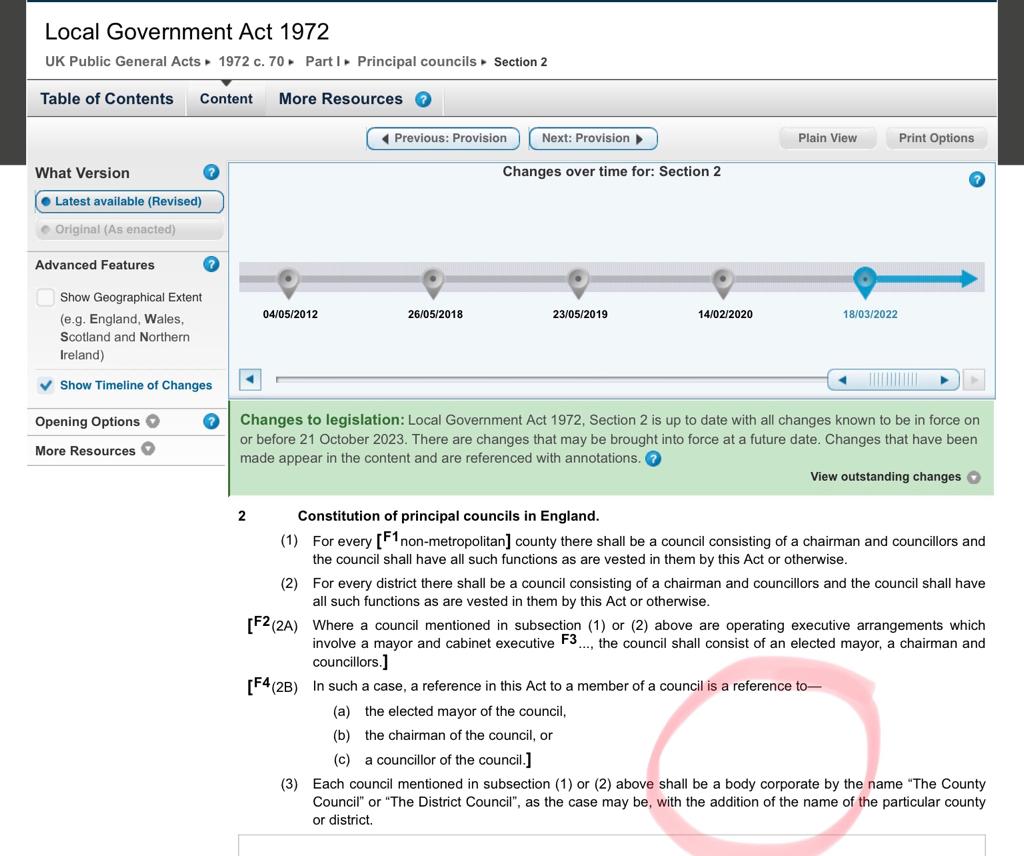
There are two main jurisdictions of Law and Governance which are: Legal Issues and Lawful ones.
This diagram below I have drawn is a very basic representation of what has been laid out above in word form. I feel it is a useful visual aid:
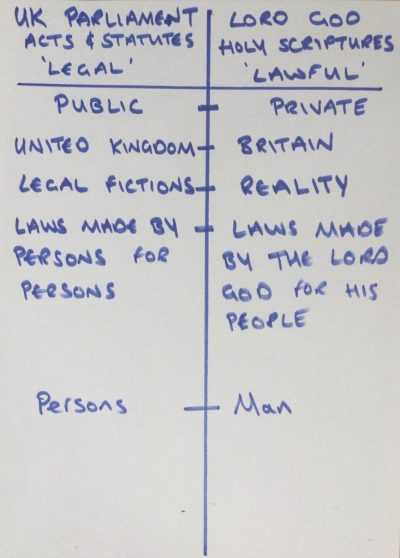
My highly technical hand drawn diagram above shows the two main jurisdictions available on every landmass with two main lawmakers; one is the legal law making bodies and process at the Houses of Parliament in The UK, and the other is the Lawful side: The Law Maker: The LORD God, to whom the Queen (formerly) and the King (latterly) swears an oath, and is also known as ‘The Defender Of The Faith’.
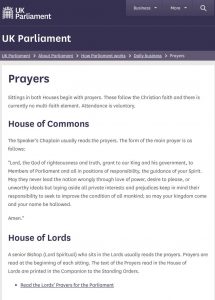
According to the Black Belt Barrister (YouTube Channel) common law undoubtedly falls in to the public side of the equation, which is the left side of the above diagram, under the UNITED KINGDOM and the legal jurisdiction. I can almost hear the shouting at the computer and phone screens from the PCL fraternity – “common law is lawful you muppet not legal, that’s why its called a law and not an Act” – My response to that accusation: even legal Acts of Parliament are lawful and law to the citizens who agreed to them and enacted them, so keep reading, and you will discover much more about the common law and why it is even called common law. All will be revealed.
The PCL ethos you will often hear within PCL groups is “do no harm and cause no loss”; a Man who is featured heavily in The Book Of The Law (The Holy Scriptures) shown to the right of our diagram put it like this “Thou shalt love thy neighbour as thyself” The Authorised King James Version (KJV 1611)
The PCL law advocates understand that they are a “flesh and blood living man.” That may sound like a strange statement to make to those not familiar with these arguments, but at least now you should be starting to understand why it is that they draw that distinction. They are drawing that very distinction to separate themselves from the legal jurisdiction, from a legal fiction that is a person; we will go on to explain these intricacies of the law in much greater detail in other articles. However the mistake that most PCL advocates make, is that they fail to fully acknowledge, mention or elaborate, on the fact that the only space available to them outside of the legal jurisdiction, belongs to The LORD God, under The Holy Scriptures. Let us see what The Holy Scriptures – The Book of The Law – The Book of Truth – has to say about “persons”. This may also be interesting to the Christian Reader:
• Job 32.21 -22, KJV 1611 – Let me not, I pray you, accept any man’s person, neither let me give flattering titles unto man. For I know not to give flattering titles; in so doing my maker would soon take me away.
• Job 13:10, KJV 1611 – He will surely reprove you, if ye do secretly accept persons.
• Romans 2:11, KJV 1611 – For there is no respect of persons with God.
• Proverbs 24:23, KJV 1611 – These things also belong to the wise. It is not good to have respect of persons in Judgment.
• James 2:9, KJV 1611 – But if ye have respect to persons, ye commit sin, and are convinced of the law as transgressors.
• Acts 10:34, KJV 1611 – Then Peter opened his mouth, and said, Of a truth I perceive that God is no respecter of persons.
The above message about persons from The Bible can be heard when Judge Kavanaugh takes his oath as a Supreme Court judge in the video link below, when he affirms he will be “no respecter of persons“. More evidence of the supremacy of the Word of God, and that The Holy Scriptures are the Word of The Law. So there you have a judge who presides over the legal and lawful jurisdictions, swearing an oath to be “no respecter of persons,” which is the very thing that every citizen is: a “person”. Are things starting to make more sense for you now?
It is clearly not good to be a person by any measure of the law. Yet most of you reading this will be citizens of your relative country, and therefore you have elected to become persons. Which is evidently bad in the eyes of God, and man.
At the UK, the Houses of Parliament are where the laws are made; The House Of Lords and The House Of Commons. If you have an MP, you are represented in Parliament at the House of Commons, and you are therefore a “commoner” (a constituent member of the body of the commons). If you have an MP, it follows that you then make the laws, you are the government. You can be a citizen of a country without necessarily also being registered on the electrical role, which I explain in other articles here – see Article #3
The laws which the government (you) enact are called Acts and Statutes. The Executive are drawn from the group of MP’s in the commons. It is the Executives roles to carry out the orders, laws and mandates of the government and oversee the UK legal, and administrative system. Since you are the government which makes the laws and elects the Executive, you can now fully understand what the term “policed by consent” means:
Here the Rt Hon MP Jacob Rees-Mogg, explains that sovereignty comes from the people to Parliament, and he goes on to explain the roles of the Executive and the government:
Statutes in general relate expressly to “persons”. A “person” is a very specific legal status which government, judiciary, police and local authorities have jurisdiction (control) over. Here are some definitions of the word “person” from the Parliamentary Acts:
• The ‘Interpretation Act 1978” at Schedule II, Section 4.(5) states:
The definition of “person”, so far as it includes bodies corporate, applies to any provision of an Act whenever passed relating to an offence punishable on indictment or on summary conviction. The same Act at Section 21. (2) also states: This Act binds the Crown.
• The “Petition Of Right [1627]” states that a ‘person’ is a ‘Souldier and Marriner’. “Soul-dier” perhaps that is a clue for the christians reading this as to why it is so bad in the eyes of The LORD God
I told you that the common law trap has an element of truth within it. The trap is so good that it is very near to the truth in parts, which is what makes it such a good trap indeed. This is why the PCL teachers and gurus go to extreme lengths to state that they are a “living man”, and not therefore a person.
Listed below are some legal maxims that are worth mentioning at this stage, and a maxim is an irrefutable truth and can be found in many legal dictionaries:
Regula pro lege, si deficit lex – In default of the law, the maxim rules.
- That which is against divine law is repugnant to society and is void.
- A fiction is a rule of law that assumes something which is or may be false as true.
- Where truth is, fiction of law does not exist. There is no fiction without law.
- All law has either been derived from the consent of the people, established by necessity, confirmed by custom, or of Divine Providence.
- Nothing is so becoming to authority [God] as to live according to the law [of God].
- An argument drawn from authority [scripture] is the strongest in law.
- It is punishment enough for a judge that he is responsible to God.
- Legal Maxim On Judges And God
There is clearly and irrefutably another option outside of, and in opposition to the legal system, however this alternative which stands above the legal system, is more of a way of life than “I need to get out of paying a parking ticket”. It is sometimes said that B.I.B.L.E stands for: Basic Instructions Before Leaving Earth. In other words, it is not an argument or tool you can just pick up and use when it may suit you, it really is a way of life.
It is clear from the evidence laid out herein that there are two main law makers: 1) Government 2) The LORD God; and the government looks to The LORD God and The Holy Scriptures for their direction every single year; as evidenced here, where the judges and top legal officials meet at Westminster Abbey to sing hymns and pray to God. Perhaps this is what Jesus meant when he stated “No man can serve two masters”.
A Successful Argument at Court Starts With Ones Status and or Capacity
Most of the PCL advocates and gurus attempt to make a lawful argument, as we have witnessed, shown, and discussed. They are attempting to draw a distinction from the legal jurisdiction (as shown in the diagram above), in an attempt to step outside of the very jurisdiction which has brought their legal issue to them, be it a debt, or non payment of tax, type of issue. Yet they are attempting to make a lawful argument, whilst seated firmly and definitely, under the legal jurisdiction, as you will discover for yourself as you continue to read on. The pitfalls of claiming common law will be revealed for all to see very clearly.
- There are a few main points that the PCL advocate will bring up in their arguments with authority, but we will focus on the biggest one, and the most fundamental one: that being when they claim “common law” jurisdiction. [What a huge mistake]
One of the main positions of argument for the PCL advocate is that they are a “flesh and blood living man standing under the common law”. I pointed out earlier that the common law trap is a very good trap, because it holds an element of the truth. The truth is that obviously they are a “living man” and not a dead breathless “legal person” under the legal jurisdiction. That bit is true as we can now see, the legal jurisdiction only recognises and deals with legal persons, which are by definition fictional, and therefore not a living thing. We will discuss and explain this further in other articles here. The biggest mistake that these PCL advocates are making is to claim the “common law” at all. They have no idea as to what “common law” is, and it is very different (as we shall demonstrate) from what they believe it is. There is a lie at the heart of a be-lie-f.
Once we explain what the common law is, it will become very apparent to you, the reader, as to why their argument contains so many flaws, and the most fundamental flaw, is that they are relying on what they call “common law”. The very thing which they believe will aid them, is actually their downfall because they misunderstand completely what it is.
The Common Law Perspective Of The Professionals
The English Common Law
The actual and real common law that is in force and effect, is known as case law which is administered by Parliament, it is created and applied by judges in the UK and commonwealth. It is not legislation per se which has been passed via Parliament, as Acts and Statutes are.
Before we start exploring the English common law and the bigger picture of the system of law and governance, here are two short videos from a Professor [albeit not a legally trained one], and another video from the Black Belt Barrister to shed some more light on this subject:
Here are a few comments on what has been stated in the above YouTube links:
Professor Jordan Peterson clearly defines the “English common law,” and points to it as a development of civilisation that has been battled out case by case in the courts.
The Black Belt Barrister mentions that government passed legislation (Acts and Statutes), are superior over the English common law. That the English common law is case law, made up of many judicial decisions, and he also mentions that English common law is under the jurisdiction of the UNITED KINGDOM.
• From here onwards, the English common law will simply be called: common law – because that is the only one there is.
What Is A Commoner?
Legislation for the UNITED KINGDOM is passed at the Palace of Westminster which is the meeting place for both the House of Commons and the House of Lords. If you are a citizen of the UNITED KINGDOM then you, by your [in]actions, and consent, have granted jurisdiction for the legislation passed at Westminster, to become the laws, which you have agreed to be governed by. A citizen will have a National Insurance Number and be paying various taxes, that are payable by the citizenry.
If you are a voting citizen of the UNITED KINGDOM (or have ever registered to vote), then you will have a Member of Parliament (MP) who represents you at Parliament, whether you voted for him/her specifically or not. You voted, or signed up to the system of voting, and gave your consent to be a part of that system. A vote is a vow, and a vow is a pledge to a deity.
Your Member of Parliament serves in the House of Commons, which is the lower house of the Parliament of the United Kingdom. Officially the first duty of an MP is to Great Britain, the second is to their constituent (you), and third duty is to their party organisation.
If you have an MP, it follows that you are a member of the House of Commons, and you are then in fact what is known as a commoner, because you voted for an MP and sent this person to the House of Commons as your representative, it then follows that you are the government that they are representing. Now that you are a commoner; which is a member of the House which enacts bills to become legislation and therefore law, you are deemed to understand this process and the legislation that you are enacting, for which you are not only a member part, but also have a representative serving there on your behalf, at your request.
Why is Common Law Called Common Law?
In all my years immersed in this subject, I have never heard anyone (layperson or professional) explain why the common law is called: common law.
Why do you think common law is called common law?
It stands to reason that it is called common law because it is the customs and practices of commoners. Commoners are those citizens that are members of the House of Commons i.e they have an MP, and are represented at Parliament. If You have a Member of Parliament representing you, or if you voluntarily registered to vote and voted once upon a time, then you also signed up to that system. “Commoners” are the general public, the UK citizenry, the Crown persons; you.
The common law is called such because you, as a commoner, are allowed by your government, and Parliament, to do anything you please, as long as these three criteria are followed:
1. That you cause no harm because harm is against every moral law and societal rules.
2. That you do not commit fraud – see point 1.
3. That the activity you are doing is itself not legislated against i.e. there is no Act of Parliament that says the activity is prohibited.
That is why the common law is called a “law” and not an Act. An Act has been enacted at Parliament. Often customs and practices of commoners have not. It is that simple. Can you now see why the version of “common law” touted by gurus on the internet is not correct? It is nearly correct, because there is a system opposite to legal rules enacted by Parliament, that is also called law and is lawful; it is the system under the governance of The Bible: the source of all Law and – The KJV 1611
Here is an example, and something to seriously consider:
If you can get a legal driving licence, the activity of driving must be (and has to be), lawful as well. Further explanation: driving has to be lawful as well because it is legal. You can not get a license to steal because it is unlawful and illegal. You can not get a licence to punch someone in the face at the pub, because those actions are illegal and unlawful – unlawful means that it is against the teachings of The Bible. The Bible is what is lawful and Parliament creates that which is legal. Two different authorities, and two different jurisdictions, separate and distinct from each other, with two different masters: what is lawful is supreme and allows what is legal to be.
Note: War is “legalised” murder under a military jurisdiction, and not a civilian legal one. The word “soldier” comes from the root word soul-dier, I do not think that needs any further explanation.
Most PCL gurus will tell you that your rights are “God given” yet they go no further. They do not go to the very book which they claim to be where your “rights” derive from, either because they are ignorant, or because that very book undermines easily their PCL beliefs and perspective. The Bible clearly denounces that which is “common”.
What is Common Law?
My comments below are in addition to what the Barrister and Professor have already explained. Those explanations do not really need elaborating on, but I will add a few more thoughts and comments of my own.
The common law derives from case law, and is administered at Parliament, and the judiciary under UK jurisdiction, under the legal jurisdiction, because it is case law created by judges at court.
For the PCL guru, hearing that the common law is under the legal UK jurisdiction will be a bridge too far, as they believe it is a lawful doctrine, and not legal one. Nevertheless we have proven beyond all reasonable doubt with evidence, professional opinion, logic and common sense, that common law is a legal doctrine administered and carried out under the legal jurisdiction of Parliament.
Common law is the system of case law, which is just that: law which is derived from the judgements of judges, of various different court cases over the centuries, and the common law is separate and distinct from the PCL taught at seminars around the country, and online by laypersons. I realise that probably does not satiate the common man reading this, so perhaps this more simple explanation will…
What the common law in practice in the UK and many other countries breaks down to in its simplest form is that persons / citizens of a polity / country are “allowed” to do anything they so please as long as said activity is not specifically legislated against by the Acts and Statutes of that Parliament; that is to say, do what you want to do as long as your activity has not been specifically legislated against, and it causes no harm, injury or loss to any one – remember that phrase? It is the phrase used by the PCL gurus and followers. There is nothing more “mystical” or “ancient” about it than that. There are no extra, or special privileges you can access by claiming “common law” jurisdiction.
- Legal Maxim – Tout ce que la loi ne defend pas est permis. Everything is permitted, which is not forbidden by law.
If that did not satiate your appetite fully, then I think this further explanation will. This is an excerpt from the book I wrote about common law many years ago, when I myself may have been called a “common law guru” by others:
The Common Law is in fact, the customs and practices of a nation. It is what is common to a people. It may be common practice (lawful) to herd sheep through the sleepy lanes of Somerset, but if you did that in central London it would be against the common law as it may cause harm to others in a busy city…
…Common-Law(s) are based upon the: Customs; Rules; Policies; Regulations; found within a Society. Set of beliefs, found within a People that are ( supposed ) to be fair and just to all of its Constituents/Citizens at that particular: Place; time
The above quote were my musings of a decade or so ago, when I wrote a book on PCL, or common law as I thought of it at that time. There is truth contained within the common law (PCL) as I keep saying, and the danger of falling in to its grasp is very real. Thankfully I did not get stuck at that particular juncture, I realised that everything in the system of governance, and especially the laws which we all have to abide by, were all pointing to one place, to one ultimate authority: The Holy Scriptures. I was only too happy to realise my mistakes, I ultimately knew that common law – as I knew it back then – did not have all of the answers, because even back then I noticed gaping holes in its theories. Thankfully my identity and ego was not tied to being a common law guru, I was humble enough to realise my mistake and move on. The local authority planning department issues I was facing at the time, were serious enough, if I made any mistakes with my argument against them, I could have faced prison time. Ten years on, and armed with real tangible evidence based knowledge – and not the theories of a guru – the local council now refuse to take me to court. I guess I must be doing something right?
Hopefully you have now gained a much fuller picture of the PCL, and can now see why so many pursuing PCL stay entrapped there in that belief system. They know they are not a “person” as defined by Parliament, yet they do not read The Bible to find out what they truly are. I have never found the phrase “flesh and blood living man” in The Bible. For the PCL believer, it seems to be a case of “I’m not that [person] so I must be that [flesh and blood living man]“. They believe that is all they need to do, to distinguish between the two things and claim the other, and say that they do not consent. This is where they are wrong.
Why Do So Many Online Common Law Practitioners Lose At Court?
I will list the main principles of “common law” that you have heard the teachers and gurus claim to be the basis of their position. We will take each “common law” principle and examine it further. The main PCL principles you will hear from gurus and internet groups are, in a nutshell, something like:
1. Do no harm cause no loss.
2. All are equal before the law.
3. We are governed by consent, and I no longer consent.
4. No contract no jurisdiction.
5. I’m a flesh and blood living man, and you have no jurisdiction over me.
6. That there can’t be a crime because there’s no injury or loss.
7. It’s the “law of the land” [not sea – admiralty].
Be in the Correct Capacity and Make the Right Argument From the Correct Position
If you are reading this article you will have heard some of the above statements before I am sure. Yes, some of those statements above are true, but…very importantly, if you are under government jurisdiction when stating them, i.e. a UK citizen, a commoner, then it does not matter one bit what you say, as all government mandates and Acts applies to you. Period. The End. For more information on these points see my article “How You Became The Government”.
If you have volunteered and consented to be under government legal jurisdiction (which undoubtedly, provably you did) as a tax paying, voter and citizen in the UK, AUSTRALIA, CANADA, US, NORWAY, DENMARK or IRELAND etc, then the only thing you have to do is to obey the government. That is it. It is that simple.
Your PCL guru may well be outside of government jurisdiction if he / she has denounced, and withdrawn their citizenship / voting registration consent, and they pay no income tax, council tax, they receive no government benefits, and do not use their National Insurance Number, which pays them a government pension; but if you are doing and claiming the above government benefits, simply repeating the above PCL numbered mantras means diddly squat. It will merely highlight your own ignorance about how you are governed to the very government that you are defying, as one of its rebellious citizens.
• Maxim – One who avails himself of the benefits conferred by statute cannot deny its validity.
After all, if you are a UK (or commonwealth) citizen you are a “commoner,” which is a member of the House Of Commons. A member of the third estate of the realm. Do you still want to be a commoner? Do you still want to be part of that which is common? Now you know what common law is; by claiming it, you are putting yourself in the legal jurisdiction.
Let us now go through those seven numbered claims above of the “common law” advocates and gurus:
1. “Do no harm cause no loss” – The Bible says it like this: Matthew 22:39 KJV 1611 – Thou shalt love thy neighbour as thyself.
2. “All are equal before the law” – God does not think so: Law is a schoolmaster
3. “We are governed by consent” – Is that a good thing? Consenting
4. “No contract no jurisdiction” – If you do not know who and what you are, that cry is meaningless. Only a legal person can enter in to a legally binding contract. Are you surety for that “person”? Proverbs 11:15 KJV 1611 – He that is surety for a stranger shall smart for it: and he that hateth suretiship is sure.
5. “I’m a flesh and blood living man” – firstly that phrase is not in The Bible, and as far as I am aware, it is not in any of the legislation, so what exactly are you claiming to be? Let us look at the definition of the word “man”. to get an idea of what these PCL advocates are specifically claiming to be, by calling themselves a “man:”
According to this definition, a man is “considered as under the control of another person”, which obviously aligns with all of the evidence that I have presented here.
• MAN as defined from a Blacks Law Dictionary is a “person” and “adult”. These are both terms that are found in all UK legislation. So yet again the PCL advocates are reaffirming that they are under the jurisdiction of the UK and legal Acts, just as they did by claiming “common law”.
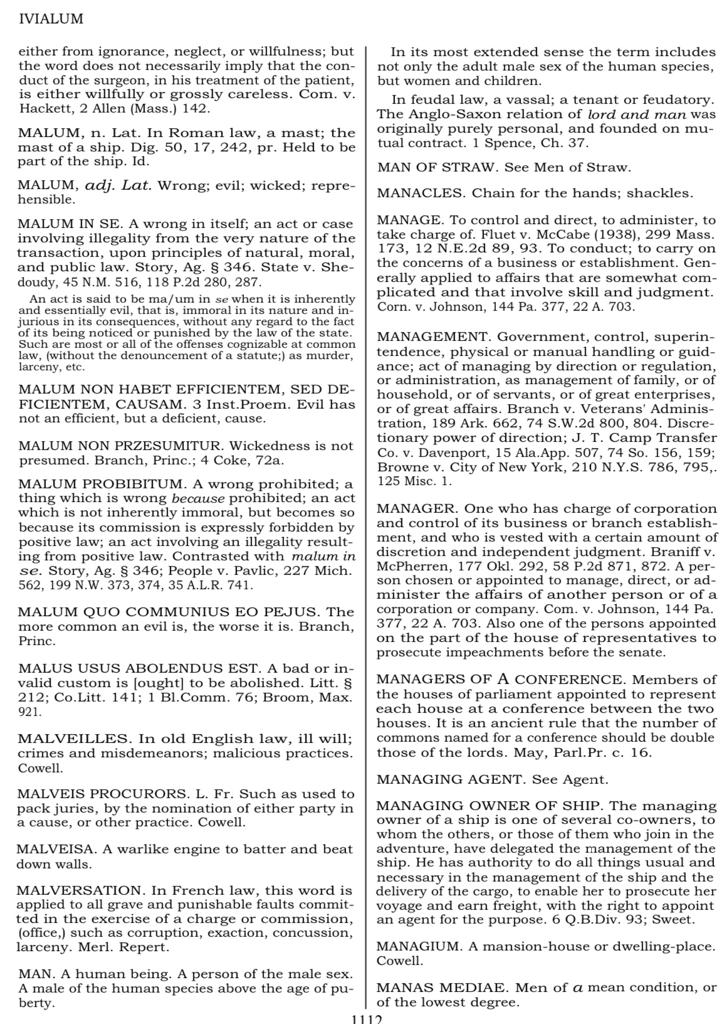
6. “No injured party no crime” – It is true that if there is no injured party there is “no crime,” but if you are a commoner, which is a UK citizen, Parliament has deemed it “criminal” to break some of its Acts. One such Act is the Town And Country Planning Act 1990, if you fail to act according to an enforcement notice issued over a planning contravention by the local authority, it is deemed a “criminal offence,” even though it is not “criminal” per se, and even though nobody was “injured”. It can be a criminal, and indictable offence not to comply with an enforcement notice, which can mean jail time.
Parliament (your ruling body as a UK citizen / commoner) deemed it “criminal” for one of its citizens to disobey one of their own Acts. That is why something can be called “criminal” that does not break any of Gods laws. Failing to comply with a planning enforcement notice, may well be criminal legally speaking, but its certainly not criminal lawfully speaking. If you harm someone by punching them in the face, it is both criminal legally and lawfully.
7. Common law is the “law of the land” – “law of the land” is a legal term and it refers to the laws in force within a country; and we have already discovered what a “country” is: it is a polity, a legal fiction. The term “law of the land” can be found in the legal charter Magna Carta 1215. The definition of Statute also contains the famous phrase.
Edward Coke, commenting upon Magna Carta, wrote in 1606: “no man be taken or imprisoned but per legem terrae, that is, by the common law, statute law, or custom of England. In this context, “custom” refers only to local custom, because general custom of England was considered part of the common law. Coke also said, as Chief Justice of the Common Pleas in the 1610 Case of Proclamations, that dictates of the King are excluded from the law of the land: “the law of England is divided into three parts, common law, statute law, and custom; but the King’s proclamation is none of them. In the same year, he decided Dr Bonham’s Case, and the U.S. Supreme Court later discussed how the term “law of the land” should be understood in view of Coke’s decision in that case.”
• The common law advocates and gurus lose at court because they claim to be a “man”, and they claim “common law”, both of which can place the advocate under the legal jurisdiction of the UNITED KINGDOM.
A Brief Mention of Article 61 of the Magna Carta
I will add this specific note on Article 61 of the Magna Carta. It will take little more than a paragraph to dispel any myth that using the Magna Carta in any way will help you “fight government tyranny”. Given everything that has been explained, this paragraph will explain why the Magna Carta advocates will never succeed in their arguments against government – and we have already discovered that persons are the government.
Legal government Statutes in general relate expressly to “persons”. As we have previously seen, a “person” is a very specific legal status which the Executive, government, police and local authorities have jurisdiction (control) over.
The Magna Carta is a charter, and a charter is a legal document. Everything legal involves “persons” (legal fictions). Put another way, if it is legal and or involves persons, then you are under the jurisdiction of the UK government.
Article 61 of the Magna Carta refers expressly to: God, Barons (which is a title) and persons. Since we have just explained and discovered; police and government have jurisdiction over “persons” and The Holy Bible looks down upon titles and persons (Job 32:21&22 KJV 1611), why would anyone wish to claim to be a person under Article 61?
- charter (n.) “formal written instrument bestowing privileges and rights, serving as legal evidence of them,” c. 1200, from Old French chartre (12c.) “charter, letter, document, covenant,” from Latin chartula/cartula, literally “little paper,” diminutive of charta/carta “paper, document” (see chart (n.)). The meaning “aircraft hired for a particular purpose” is from 1922.
Common Law: A Summary Based Upon The Evidence
As you can see for yourself, I have laid out evidence to explain reasonably, logically, legally, and scripturally, precisely why the common law advocates are incorrect and it was easy to do. I did not just manage to prove one of their “common law” assertions wrong, but most of them with evidence, logic, and reason. Critically, I proved that they are claiming the wrong jurisdiction, by claiming that they are a “man”, and by claiming “common law” itself. What a trap indeed.
If they are not a “man” or “person” what are they? Nobody can tell you who or what you are, not even the Crown, and The LORD God lets you make your own decision, and most of us made the wrong choices.
We bring all of this on to ourselves because we make ignorant proclamations, and do not often know what we are talking about. I can not tell you what you are, but I can tell you where to go look to find the evidence for yourself:
• The King James Version of The Holy Bible 1611
Most things espoused at PCL groups online are warned against in the Bible, apart from “do no harm”. Most gurus claim your rights are God given yet do not seem to promote, nor have researched the very book which holds Gods Word; because if they did their “common law” argument would collapse.
This is why Judges can win on any number of points. If I can pick holes in the PCL argument, I am confident that most Judges can. That is why so many online PCL discussions end in insults and derision, when some of these holes are pointed out to them. Because they are nearly true, but not quite, and if it is not true, it is not right.
The PCL gurus can not prove any point of their position with genuine court admissible evidence, or if they think they can, The Bible will quickly disprove it, or over rule it very easily. Which is why it is so infuriating for some PCL advocates, and I sympathise with their conundrum. They know things are not right in the world, they think they have found the answer: “common law,” it sounds right, it explains so much. Yet it is easily dismissed and beaten with common sense, and actual evidence. This causes conflict with so many stuck in the “common law” trap, vigorously, blindly, defending their belief. Unless the victim has an open mind, and is humble, trapped at PCL is where they will stay sadly, and almost all do. Most of the common law gurus you see on the internet today have not changed their story or views on “common law” for decades. I know as I have “followed” them.
Whoever is giving you information or advice, must be able to prove what lays behind their position with tangible facts, and evidence to substantiate what they claim. We need to grasp the basics about evidence. Evidence has a hierarchy. Not all “evidence” is accepted by the Crown at court. We have another article on admissible facts and evidence.
I have been debating and arguing law and governance online for many years. I have gone to a few of the popular common law gurus seminars. I have met a handful of these people at various court cases and demonstrations, and have tried to stop house evictions by the police, and bailiffs. They (the advocates), are mostly genuinely nice persons and well meaning, they have come across this “common law” information and knowledge, and have stopped at the first plausible explanation. They have not gone on to fully examine the structure and principles of law and governance.
Admittedly some advocates have tried their ideas at court in some very serious cases as we have seen. Sadly their ideas were found to be incorrect. Instead of re-examining the facts and evidence of their own arguments, many advocates double down on their theories, and then result to the position: “the corruption of the state”. I was always told “when you point at someone else, there are three fingers pointing right back at you.” We have seen and evidenced that “corruption” is not the reason they lose; their arguments are the reason they lose. We have seen and evidenced that their arguments have little basis in reality, fact or law, and that they are predominantly making their mistaken assertions from the wrong status, and capacity anyway; they are making their claims fully and wholeheartedly from the legal jurisdiction, as a legal entity (man / person) by claiming “common law” in the first place. We will explore in much more detail in other articles what a “man” and “person” is, as far as the law is concerned.
A lot of other “common law” supporters spend their time in the chat rooms of their groups theorising on the law and confidently stating their opinions as facts. Many have nothing at stake, what you think you know is nearly meaningless. How can you ever know it to be true if you have never tested it, or used it? If you build a boat you will not truly know if it floats until it is put on the water under a load, and in choppy conditions. See article #2 – What do you know?
I have risked imprisonment for the arguments that I have made, and the position I have taken with regards to how I am governed, or not governed. I have followed what my own research has led me to see is true, and I have tested much of it at many different courts around the country, either for myself, or with other people. I have tested my “boat” in choppy seas, and have shared some of what I have learned here – the blueprint and instructions for building your own boat. The information laid out here needs further examination for you to know it to be true, that is for you to find out and scrutinise, because if you merely take my word for it, then I am no better than a guru, and you are only a “follower”. But if this information resonates with you, maybe you can examine the boat manual for yourself to see if you have a seaworthy vessel, because if a legal tsunami is coming in your life, the Truth may just save you from drowning.
The PCL gurus have these two things right:
1. Your “rights” come from God not man.
2. Do no harm, cause no loss.
This article aims to stop the self inflicted harm, and point the reader toward the Truth. I genuinely hope that it helps some of the gurus themselves because they are the ones that are most likely to fall foul of The Common Common Law Trap For Commoners.
I call some of them gurus because if their followers have to have the facts, the evidence, and the law interpreted via a “man”, then it is not evidence, it is hearsay. You should be able to go to the source of the evidence of which any belief is based upon, to scrutinise it for yourself. If you can only understand something via someone else, then it is a belief system and not the Truth. You may be in a cult. Just as you do not have to go to a church and hear a Vicars thoughts to find God, you just open the Bible, the source of His Word. The evidence on the Law and how you are really governed is readily available, go read it for yourselves, and know for yourself.
I hold that this article, and my argument, is self evidently true, and so simple that a child can understand the position laid out. All of the evidence mentioned and linked herein can be scrutinised and verified at source, without the aid of a middle man. No belief or guru required; just common sense.
• “The man who never alters his opinions is like standing water, and breeds reptiles of the mind – William Blake.
• “My people are destroyed for lack of knowledge: because thou hast rejected knowledge, I will also reject thee, that thou shalt be no priest to me: seeing thou hast forgotten the law of thy God, I will also forget thy children” – Hosea 4:6 KJV 1611.
For more articles on Law and Governance please see the Home Page
If you enjoyed the article please consider sharing it. If you gained any value from my work, and would like to add your support, all donations are very gratefully received.
CME
